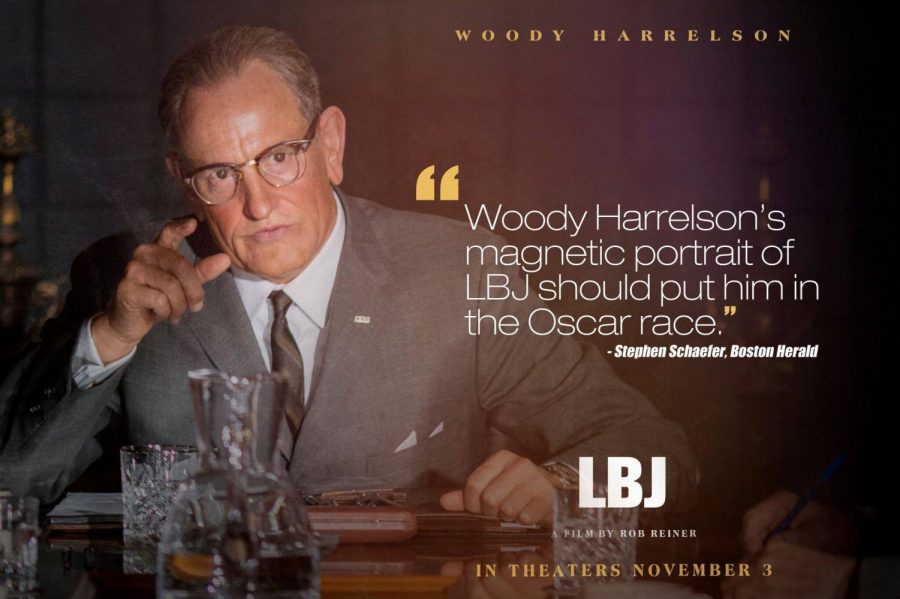Rob Reiner Returns to Old-School Class with ‘LBJ’
The film “LBJ” tells the story of former president Lyndon Johnson, as portrayed by Woody Harrelson, and his rise to power.
November 1, 2017
“LBJ” is the kind of film that makes you step back and say, “They don’t make them like that anymore.” Rob Reiner’s latest film would feel right at home in the ’80s and ’90s — a sweeping, melodramatic epic centered around a show stopping performance by a seasoned veteran. The film finds company with other callbacks such as Steven Spielberg’s “Lincoln” or “Bridge of Spies,” old-school procedurals built on the world’s best actors fighting through intense monologues and speeches, while embracing all of the flashiest technology and toys.
Though his legacy is muddied and he lacks the household name status of other presidents, Lyndon B. Johnson was the most powerful and feared politician for a decade — from his time as leader of the Senate, vice president and ultimately president. Reiner’s film chooses to cover a particularly tumultuous time in his — and America’s — history: the end of Johnson’s Senate leadership, his failed presidential campaign and his time as vice president before the assassination of John F. Kennedy. The film reaches its emotional core when it depicts Johnson grappling with acquiring the power he has always wanted through tragedy, trying to delicately handle Kennedy’s legacy and pushing to bring the Civil Rights Act forward.
“LBJ” orbits around one star — Woody Harrelson. He is a force in this film: serving a surly, ball-busting, loud and quietly human performance with just the right amount of excessive ham. From giving a fiery speech on how the “Southern Way of Life” wasn’t worth preserving if it meant his people like his maid were treated as second-class citizens to calling his tailor to demand pants that accommodate his “large” genitals, Harrelson never falters in his convincing performance.
The film’s most interesting and murky moments are during the debates over the passing of the Civil Rights Act, as Johnson is presented as the deciding factor in a battle between Southern Dixiecrats and Northern progressives. There is a scene in which, following the death of Kennedy, the Southern Senators form a prayer circle around Johnson, thanking the Lord that the “prosecution” of the South will now end. This odd dissonance ends up making the film strangely fresh, as the depictions of both subtle and outlandish racism feel real. The moment where Harrelson called a senator racist to his face while picking apart his nonsensical defense of “The Southern Way” was cathartic.
While some people may cringe at Johnson being cast as a hero in the Civil Rights battle, it ultimately serves as one of the film’s central themes. The audience is never given a clear answer on his true motivations; whether he genuinely believes in equal rights, wants to honor Kennedy or does it for political power. However, we do know that Johnson is both a man of unquenched ambition and intelligent enough to know which way the wind blows. After entire presidencies of attempted social reform being shut down, Johnson’s practical, arm-bending skills proved immeasurably valuable.
Reiner was one of the under-appreciated great directors of the ’90s, and once again, he shows why. “LBJ” is an old-school, solid, sharp, uplifting film that makes you laugh, hits all the right notes and leaves you feeling good. With the current state of our world, maybe some old-school, feel-good cinema is exactly what we need.
“LBJ” opens in theaters nationwide on Friday, Nov. 3
Email Carter Glace at [email protected].

























































































































































Barry Markowitz • Nov 3, 2017 at 8:51 am
Totally worth seeing… Reiner and Woddy teaming up for sure
Paul Wilson • Nov 1, 2017 at 1:59 pm
Whoever wrote “He lacks the household name status of other presidents” was obviously born after 1968 and never even read a book on the 1960s. LBJ was a force of nature, the last classical politician to hold the office.